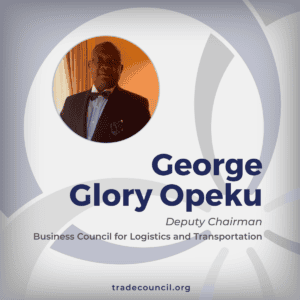 George Glory Opeku – Deputy Chairman of the Business Council for Logistics and Transportation.
George Glory Opeku – Deputy Chairman of the Business Council for Logistics and Transportation.
Meet George Glory Opeku, an accomplished business leader who serves as the Deputy Chairman of the Business Council for Logistics and Transportation within the International Trade Council. With extensive expertise in logistics, international trade, and supply chains, George is a prominent figure in the industry.
George currently holds the position of Chief Executive Officer at Portlink Ghana Limited, a company deeply rooted in the logistics and transportation sector. Portlink Ghana Limited specializes in a range of services, including import and export haulage, warehousing, and consultation. This strategic focus has allowed the company to play a pivotal role in facilitating the smooth flow of goods and services within the international trade landscape.
George’s journey in this industry began by learning from experienced individuals who were already established within the logistics and transportation sector. His hands-on experience and commitment to learning paved the way for his impressive career.
Education and qualifications have been essential pillars of George’s success. He holds an Executive Diploma in Innovation Management and Leadership, complemented by certification as an Innovation Professional. These qualifications have equipped him with the skills and knowledge needed to navigate the ever-evolving business landscape.
Throughout his career, George has been involved in key projects that have contributed significantly to his success. Notably, he served as a project manager for newly established companies, including a steel factory and an oil refinery. These companies aimed to operate under the “One District One Initiative,” a government-driven program designed to stimulate economic growth.
One of George’s proudest professional accomplishments was eliminating the need for outsourcing transportation needs by acquiring tractor trucks, a strategic move that enhanced the company’s self-sufficiency.
Reflecting on industry evolution, George acknowledges the shift towards a more paperless and technology-driven landscape. These technological advancements have significantly expedited the delivery of goods and services within the logistics and transportation sector.
However, the industry faces its share of challenges, including government policies related to taxation concerning imports and exports, as well as access to critical data and information.
Looking ahead, George envisions the logistics and transportation industry becoming more AI-based, with minimal human intervention, ensuring greater efficiency and precision.
In terms of emerging technologies, he is excited about the total automation of port operations and the deployment of electronic Bills of Lading (eBL) by the International Federation of Freight Forwarders Associations (FIATA). These innovations promise to revolutionize the way goods are transported and tracked. For aspiring professionals entering the industry, George underscores the importance of having a mentor to guide and provide valuable insights.
When faced with setbacks and challenges, George’s approach is methodical. He identifies the issue and implements measures to prevent its recurrence or ensures that there are effective strategies in place to manage it if it arises again.
In his field, George draws inspiration from role models such as Jacob Gbeti, CEO of Global Cargo, and government officials like Yao Fechin Akoto and Bismark Kissi, who contribute significantly to customs and trade regulations.
Outside of his professional life, George enjoys a range of interests, including reading, meditation, and traveling. These pursuits offer him a well-rounded perspective and enrich his personal life beyond the realm of business.

















